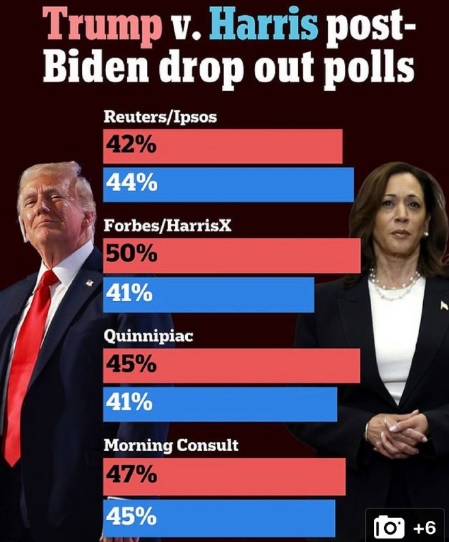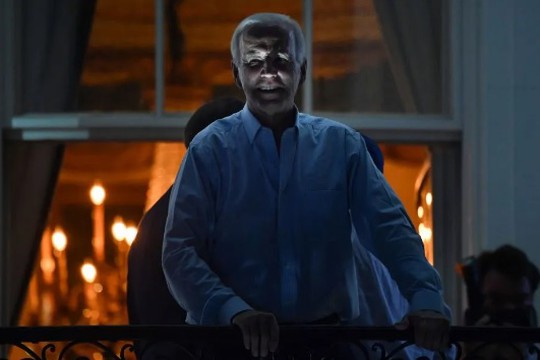Biden haunts a White House balcony.
Photo: UnHerd
Who is in charge of America? While it might be impossible to confidently call the outcome of the election in November, the very near future is quite easy to predict: more political chaos, paranoia and uncertainty, cries ‘UnHerd’.
On Sunday, the impossible finally came to pass. Joe Biden, after swearing that only the Lord Almighty himself could compel him to step down from the 2024 presidential race, suddenly revealed that he was finished. The announcement, which only came in the form of a social media post, caught his own staffers by complete surprise.
To say that this is an unprecedented situation risks underselling the uniqueness of the current moment. Not only are we in very strange territory electorally (given the announcement’s proximity to the party convention), but there is also a sense that something has gone seriously wrong with the political system itself.
As I write, there is growing concern — bordering on paranoia — that Joe Biden might not actually have signed his resignation letter. Comparisons between the letter’s signature and those on previous executive orders are being circulated, and other curious details, including the absence of an official White House letterhead, are also being poured over.

But whatever the details, one conclusion has been reached: Joe Biden is out and Kamala Harris is in. This is currently being met with a fair degree of celebration among many on the American Right: Harris is a notoriously weak candidate, one who is prone to gaffes and was completely unable to make headway in the 2020 Democratic primary. But counting your electoral chickens before they hatch is never wise, and certainly not in these extraordinary times. Biden himself was also a notoriously weak candidate (having tried to run for president several times and failed spectacularly every time), even more gaffe-prone than Harris, and only became the 2020 Democratic nominee as part of a concerted insider plot to stop Bernie Sanders. Neither Harris nor Biden could ever hope to win even a remotely competitive Democratic primary if their lives depended on it. But as we learned in 2020, a basic inability to win a primary race does not mean a candidate can’t then go on to win the presidential race.
And yet, 2024 is not a year that lends itself to easy predictions. In the space of just over a week, the US has seen one presidential candidate shot, and the other step down under murky circumstances. The idea that Trump now has an automatic path to victory reeks of the same complacency that saw him lose in 2020, and that spurred so many hopes for a massive “red wave” in the 2022 midterms.
But while it might be impossible to confidently call the outcome of the election in November, the very near future is quite easy to predict: more political chaos, paranoia and uncertainty. Biden’s decision to remain as president even as he now concedes he is unfit for the job of campaigning for re-election is not at all tenable. Already, more and more Republicans are stating the obvious: if you aren’t healthy enough to run for president, you clearly aren’t healthy enough to be president. Chances are that a real battle to remove Biden from his perch inside the Oval Office is about to commence — either through convincing or coercing him to “voluntarily” step down, or by invoking the 25th Amendment. The latter would be an entirely unprecedented watershed moment, but unprecedented watershed moments seem to have become a dime a dozen in America of late.
There exists an old African proverb: when the elephants fight, it is the grass that gets trampled. It is tempting to analyse these large, chaotic movements inside the American political system simply in terms of the political rat race: what, one might ask, would it mean for large donors if Biden had continued to run? But while that might still be interesting, the wider context to all this chaos is more important. Who is even in charge at this point? Is it Barack Obama, or Nancy Pelosi? Is it Joe Biden himself, despite all the signs to the contrary? Or is nobody in charge?
Few seem to be able to answer these questions in an authoritative manner, and it seems increasingly unlikely that the election will solve this fundamental brokenness. A Trump win is unlikely to calm the paranoia that has seeped into the walls of the American political consciousness; a Harris win, especially at this point, might not be accepted as legitimate by a very large number of Republicans.
So, while America isn’t quite yet at the same level of crisis as the Soviet Union in 1991, even acknowledging that is to damn the US with some very faint praise indeed. It’s true that renditions of Swan Lake aren’t yet playing on an endless loop on CNN and MSNBC, urging the Soviet citizens of America to remain calm as the tanks roll up Pennsylvania Avenue. But faith is surely starting to wane. Some may say that Biden’s departure is proof that America’s political system is working. But just as the past few months have proved the opposite, don’t be surprised if the next few do the same.

In USA 62% concerned about election cheating!
Most voters think this year’s election could be impacted by cheating, nearly one-in-five say they received multiple mail-in ballots in 2020 and nine percent (9%) of voters nationally are either not U.S. citizens or aren’t sure if they’re citizens.
A new telephone and online survey by Rasmussen Reports and the Heartland Institute finds that 62% of Likely Voters are concerned that cheating will affect the outcome of the 2024 election, including 37% who are Very Concerned. Thirty-five percent (35%) aren’t concerned about election cheating, including 15% who are Not At All Concerned.
Eighteen percent (18%) say that, in the 2020 election, they personally received more than one official ballot in the mail or received a ballot for someone who does not live at their address, while 74% did not. The number who say they got multiple mail-in ballots in 2020 is higher (20%) among voters in six states (Arizona, Georgia, Michigan, Nevada, Pennsylvania and Wisconsin) viewed as key “battlegrounds” in this year’s election. “The fact that more than 60% of likely voters are concerned about election integrity should be a massive wake-up call to all those who refuse to admit that potential cheating in elections is a major problem,” said Chris Talgo, editorial director of The Heartland Institute.
“As the 2020 election demonstrated, mass mailing of ballots based on outdated voter rolls, ballot harvesting, unattended drop boxes, and no excuse mail-in voting has made it easier than ever for those who are committed to breaking the law and illegally voting. The fact that nearly one-in-five likely voters received multiple ballots before the 2020 election cements the case for the urgent need for election integrity reform measures across the states.”
The survey of 2,466 U.S. Likely Voters, and 5,605 Likely Voters in six battleground states – Arizona, Georgia, Michigan, Nevada, Pennsylvania and Wisconsin – was conducted on July 5-12, 2024 by Rasmussen Reports and the Heartland Institute. The margin of sampling error is +/- 2 percentage points for the national results, and +/-1 percentage points for battleground states.
read more in our Telegram-channel https://t.me/The_International_Affairs

 12:18 26.07.2024 •
12:18 26.07.2024 •























